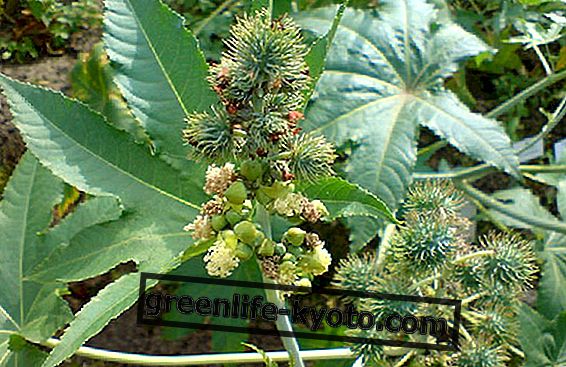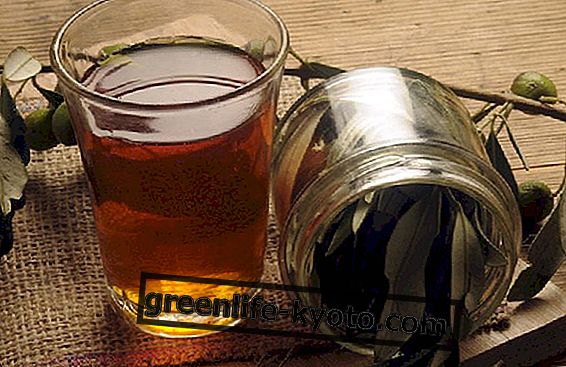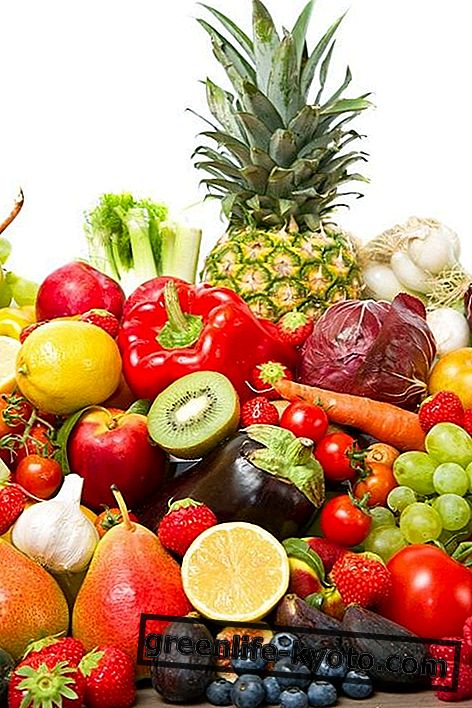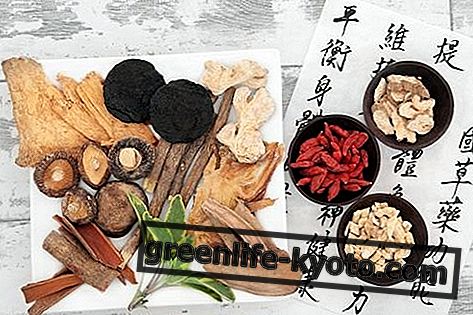
Bach discovered and experimented with his famous flowers in different phases. At the end of his study he divided the flowers into seven main groups, depending on the imbalance and the corresponding quality that tended to rebalance, specifying with each group a particular and usual way, on the part of the individual, to face life.
For each flower there is a particular imbalance, but there is also a value badly managed by the personality: for Bach in fact there were no defects, but only qualities that were not used.
1. Bach flowers of the fear group
The flowers belonging to this group deal with fear as a limiting feeling that mentally and energetically anticipates a situation that paralyzes. Fear does not allow us to live freely. The flowers of the fear group are:
Aspen : non-specific fears, sense of imminent misfortune without knowing how to indicate a precise cause, these fears due to an excessive opening to external vibrations; talent is calibrated and accepted sensitivity;
Cherry Plum : fear of losing control due to the overload of images and sensations deriving from one's own depth; the connected talent is the ability to immerse yourself in the depths with confidence to draw wealth and self-knowledge;
Mimulus : specific fears of closed environments, insects, defined accidents, fear of the world and shyness due to excessive sensitivity to the surrounding environment in its concreteness; the connected talent is to integrate into the concrete world;
Red Chestnu t: excessive fear for others and for their fate; the connected talent is the care of others and of oneself in equal measure;
Rock Rose : paralyzing fear due to recent shock, when one is led to unconsciousness, fainting; the connected talent and the courage to face the emergency situation that presents itself.
2. Bach flowers of the uncertainty group
Uncertainty is the feeling that comes when you are going somewhere and you hesitate, when you no longer trust the road taken, for various reasons.
Even uncertainty immobilizes, like fear, but instead of creating panic, it generates mistrust and doubt .
The flowers of the uncertainty group are:
Cerato : uncertainty of one's own judgment and intuition, they continually ask for the opinion of others; the connected talent is trust in one's vision and in oneself;
Gentian : uncertainty that causes pessimism and discouragement, they no longer have hope; the connected talent is the faith that everything is for the best;
Gorse : uncertainty and desperation resulting from great efforts, when he no longer tries and no longer believes he can improve himself and his situation; talent is the acceptance of the situation with serenity;
Hornbeam : uncertainty about one's mental abilities, due to overloading and fatigue; talent is the ability to refresh the mind and let go of too heavy loads that are imposed on themselves;
Scleranthus : uncertainty between two situations, one continues to pass from one to the other; talent is the balance that integrates every aspect, consciously choosing one thing among many;
Wild Oat : uncertainty about your task and your highest goal, about what is really important to achieve in your life; talent is the clear vision of one's vocation and needs.
Treating panic attacks with Bach flowers
3. Bach flowers of the group of insufficient interest in the present
The lack of interest in the here and now does not allow you to live your life in full. Who needs the flowers belonging to this group often wanders with the mind towards the past or towards the future, escaping from the present and dispersing its own vital force and its deep motivations, remaining inconclusive and tired, exhausted by this continuous fleeing reality. The flowers belonging to this group are:
Chestnut Bud : lack of interest in the present because one is not able to learn from experiences, and this leads to infantilism and repetition of the same errors; the connected talent is the full learning in the here and now from what happens, completely immersing oneself in the experience and in what it means;
Clematis : lack of interest in the present determined by an escape in one's imagination, with the head in the clouds, and in the projection of the future; the connected talent concerns the ability to create a fulfilling and full reality at this time;
Honeysuckle : the lack of interest in the present is expressed with the regret of the past; talent is the ability to break away from what has been;
Mustard : those who need this flower are immersed in a black cloud of depression and oppression that cannot be explained, that comes suddenly and so suddenly it goes away; talent is the ability to maintain serenity even in the dark moments and in the storm of unexplained negative emotions;
Olive : lack of interest in the present because completely exhausted on all levels: mental and physical; talent is the ability to connect with a higher energy source and to act again and again without running away from one's responsibilities;
White Chestnut : lack of interest in the present due to mental brooding that leads everywhere except where it really is at that moment; the connected talent is the control of the mind and the ability to direct one's mental intent;
Wild Rose : lack of interest in the present due to a total lack of motivation to life and action that leads to a passive acceptance of what happens; the connected talent is the inner drive that makes one act to create one's life.
4. Bach flowers from the solitude group
In those who need the flowers of this group there is a removal from love in all its forms, because it is lived in a wrong way. The flowers in this group are:
Heather : loneliness due to excessive egocentrism that everything and everyone wants to focus only on themselves; talent is empathy towards others;
Impatiens : for those who need this flower, solitude comes from an intolerance towards those around them; talent is linked to knowing how to accept the rhythms and ways of others;
Water Viole t: solitude here is determined by a sense of misunderstanding that leads to withdrawing from the world and being on one's own, sometimes with an intimate sense of superiority; talent is the contact and humility of knowing that we all belong to the same humanity;
5: Bach flowers from the hypersensitivity group
The flowers of this group represent those who are too sensitive to influences or external ideas, bringing people into addictions and servility, as well as rooted selfishness and anxieties, because they are not able to use this sensitive sensitivity in the proper way towards their own and who is around. The flowers in this group are:
Agrimony : hypersensitivity to what is unbalanced and disharmonic, both within oneself and in external situations, hiding torments from others and often also from oneself; the connected talent is harmony with what happens, finding for each situation the right weight and location in one's life;
Centaury : hypersensitivity to others, leads to servility and the uncritical acceptance of everything in order not to be alone; talent is intelligent service towards those around, becoming helpers but not servants;
Holly : hypersensitivity to the negativity of the external world that leads to a total closure of the heart, turning in on itself in a sterile egoism; talent is superior and unconditional love towards everything, and descent into the depths of one's heart, opening it to emotions as they are;
Walnut : hypersensitivity for temporary hesitation on the decisions to be taken, in moments of great change; talent is protection from external influences and firmness on one's goals.
6. Bach flowers from the group of despair and discouragement
It is the largest group and combines different forms of despair and discouragement .
The flowers are:
Crab Apple : discouragement and despair because one judges one's disordered and dirty life, generates shame for oneself and for the most natural aspects of being human; talent is love towards oneself and purification from this state of shame and fury in wishing that everything is perfect and pure;
Elm : discouragement for an excessive sense of responsibility, because great ideals are cultivated and it is difficult to pursue one's goals; talent is the development of a healthy sense of one's limits and the certainty that one's contribution, whether large or small, is important for the whole and the community;
Larch : a sense of inferiority and discouragement in improving oneself, continually putting oneself in a demeaning comparison with those around; talent is the right assessment of oneself without indulging in victimhood and without bringing the outside as a yardstick;
Oak : as for Elm, Oak is also discouraged because of an excessive sense of responsibility and duty, in this case towards himself (for Elm the sense of responsibility concerned others more than themselves), resulting in chronic fatigue; talent is the responsibility of managing one's own strength, without running out;
Pine : it is the flower for those who cultivate the sense of guilt for whatever happens, this leads to punishment because one is not as one would like; the connected talent is the right assessment of one's own responsibilities, without taking on responsibility for what is not our responsibility;
Star of Bethlehem: it is the flower for those who have suffered trauma and has not yet solved them, whether they are from a distant past or recent, for those who feel hopeless and discouraged for this; talent is freedom from what generates great pain;
Sweet Chestnut : desperate because he feels he can no longer cope, that he has touched the bottom of his resources, overwhelmed by anguish, this happens in those who are facing change and are unable to find additional resources to continue; the talent is the rebirth and the fulfillment of the change so long pursued and cultivated;
Willow : discouraged because he sees in others the dark side that he cannot integrate into himself, and therefore feels himself to be the unjust victim of the world; the connected talent is the responsibility of oneself and the acceptance of the experiences of life and one's own limits, lovingly welcoming and integrating them.
7. Bach flowers of the group of excessive concern for the welfare of others
To this group belong the flowers of one who leads to excess feelings such as attention to others, concern for others; it is also the group of excessive manifestations of feelings.
The flowers of the group of excesses are:
Beech : excess criticism of others, intolerance, need to see more "perfection" in the cirocstante world; talent is the tolerance of the human aspects of each;
Chicory : excessive possessiveness and excess care of others, inability to be alone and desire, with their own care, to win over the people they love; talent is the right love that does not become oppression;
Rock Water : excess of judgment towards oneself and rigidity towards oneself and one's ideal of life; talent is the flexibility that makes it possible not to repress those parts of the self that are not perfect in their own eyes;
Vervain : excess of enthusiasm, in one's own ideas and experiences, which leads to trying to convince others of the rightness of what one believes, thinking of doing them good; talent is the right enthusiasm that does not become a driving force for proselytism and abuse of power;
Vine : excess of personal power, which can lead to arrogance; talent is the balanced power that also leaves room for the way of thinking and living of those around, without trying to fix everything.













